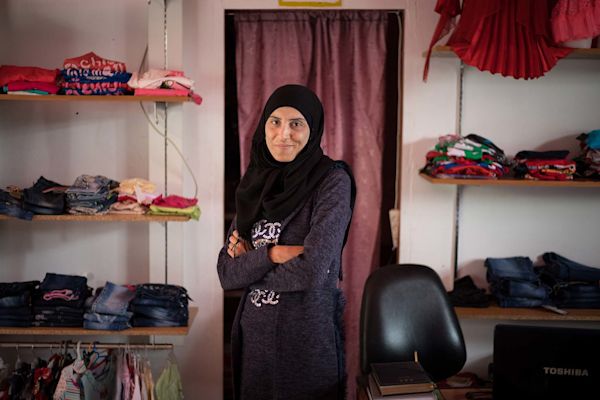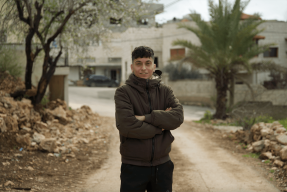How a determined refugee went from customer to business partner
June 18, 2018
The Kiva community is rallying to raise $1 million in loans for refugees and internally displaced people by World Refugee Day, June 20.
Perched on a hill in Lebanon overlooking rolling green farmland, sits a small apartment building shaded by grapevines growing over the front patio. It's quiet, with very few passing cars and only the sounds of birds chirping and women and families laughing.

But this sweet scene masks a deep pain that permeates the community, as war, displacement, and struggle have marked their recent lives.

Nour, who lives in one of the apartments, is from the active war zone of Idlib, Syria– a stark contrast to her current location. Her happy engagement back in Syria was quickly shaken, as war and combat became more rampant in Idlib, and her fiancé was forced to flee to Lebanon for safety. With no choice of being together in Syria, Nour left her family behind to join him in Lebanon.
 Nour with her son, born in Lebanon
Nour with her son, born in LebanonLife changed drastically for Nour, who now found herself in a much more expensive country where she had to contribute to the income of the family. Aid to Syrian refugees is limited, and many Lebanese won’t hire Syrians, so refugees have to be entrepreneurial while faced with laws that are not in their favor: They lack access to most financial institutions that could help them start up a project, and they must be in partnership with a Lebanese citizen if they want to start their own business.
Nour saw an opportunity at a clothing shop that she frequented and thought they could use some help. After gaining the courage to ask the owner for a job, Nour soon found herself as an employee. Not long after, her boss needed even more help and asked her to step up to be her business partner- she just needed to do her part in bringing capital to the business.

“I was surprised a Lebanese asked for a Syrian to partner,” Nour shared with a beaming smile, for as tensions between the communities have risen, this is exceedingly rare.

Kiva's Field Partner Al Majmoua is one of the only credit options for Syrian refugees in Lebanon. Because of their willingness to lend to refugees, Nour was able to step up into a business partnership that would otherwise be unattainable. With a loan of $700, funded by Kiva lenders, Nour purchased additional clothes to stock the store and grew her profits from $250 per month to $400 per month.

“Because of the increase [in income] I’m thinking of changing my house," she said.
Nour hopes to create more space for her family of 4 who currently live in one main windowless room with a small separate kitchen and toilet.
While the loan is greatly improving her and her family's new life in Lebanon, for Nour the ultimate goal is not fixing her house but her home: “My main aim is to get back to Syria. Everyone loves their own country."
PREVIOUS ARTICLE
In Rwanda, Congolese refugees rebuild →NEXT ARTICLE
In the Syrian Civil War, one minute can change everything →










